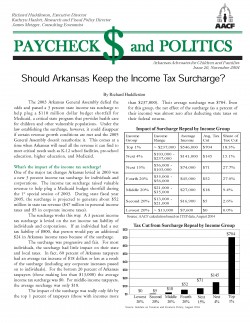
The 2003 Arkansas General Assembly defied the odds and passed a 3 percent state income tax surcharge to help plug a $110 million dollar budget shortfall for Medicaid, a critical state program that provides health care for children and other vulnerable populations. Under the law establishing the surcharge, however, it could disappear if certain revenue growth conditions are met and the 2005 General Assembly doesn’t reauthorize it. This comes at a time when Arkansas will need all the revenue it can find to meet critical needs such as K-12 school facilities, pre-school education, higher education, and Medicaid.
What’s the impact of the income tax surcharge?
One of the major tax changes Arkansas levied in 2003 was a new 3 percent income tax surcharge for individuals and corporations. The income tax surcharge raised valuable revenue to help plug a Medicaid budget shortfall during the 1st special session of 2003. During state fiscal year 2005, the surcharge is projected to generate about $52 million in state tax revenue ($47 million in personal income taxes and $5 in corporate income taxes).
The surcharge works this way. A 3 percent income tax surcharge is levied on the net income tax liability of individuals and corporations. If an individual had a net tax liability of $800, that person would pay an additional $24 in Arkansas income taxes because of the surcharge.
The surcharge was progressive and fair. For most individuals, the surcharge had little impact on their state and local taxes. In fact, 60 percent of Arkansas taxpayers had an average tax increase of $18 dollars or less as a result of the surcharge (including any corporate increases passed on to individuals). For the bottom 20 percent of Arkansas taxpayers (those making less than $13,000) the average income tax surcharge was $0. For middle-income taxpayers, the average surcharge was only $18.
The impact of the surcharge was really only felt by the top 1 percent of taxpayers (those with incomes more than $237,000). Their average surcharge was $704. Even for this group, the net effect of the surcharge (as a percent of their income) was almost zero after deducting state taxes on their federal returns
